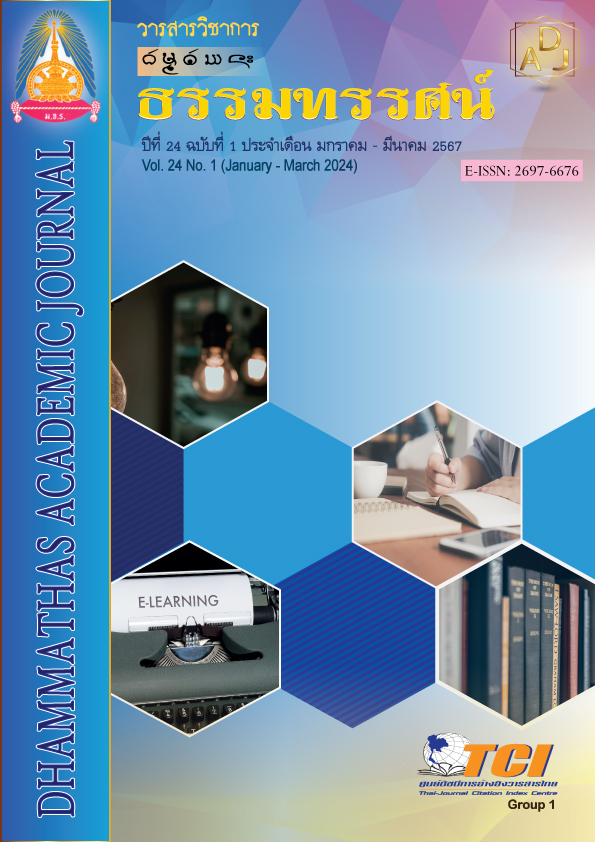Cultural Management of Buddhist Communities along the Border of Loei Province
Main Article Content
Abstract
This research the objective is to study the cultural management of communities along the border of Loei Province. This research therefore used a qualitative research format. Tools used in this research It is an in-depth interview. There were 25 important informants or people. Analysis and summary of information from the documentary study. Analysis of data from in-depth interviews Data analysis, focus group discussion, analysis, synthesis, and summary of research results.
The research results found that: Collect information about Buddhist community culture according to categories. It is a collection of information about Buddhist community culture according to categories due to the remote area. Developing the potential of officials according to the Buddhist policy is quite difficult. Most of the personnel who do not have specific expertise perform duties in remote areas. Sometimes communities make demands based on rules and regulations that result from customs and traditions. Various beliefs of the community based on local wisdom, rituals, religion, culture according to the way of life and culture within the community. Organize activities to promote community culture according to the categories of people in the community. Are interested in organizing activities to promote culture, economy, society, and politics in their own community Village leaders recognize the importance of organizing activities to promote the economy and society in the community by organizing groups to continue working on the community economy, both medium and small. The operation of preserving the culture and local wisdom is the people and people in the village community. There is the principle of freedom in living life. Speaking and writing independently Strengthen networks and create cooperation between networks The stimulation for the development of physical ethics lies in creating a quality education system that focuses on changing bad behavior to desirable behavior for youth and people living in the area. That is, stimulating the use of the education system will be the most effective investment in practice.
Article Details

This work is licensed under a Creative Commons Attribution-NonCommercial-NoDerivatives 4.0 International License.
เพื่อให้เป็นไปตามกฎหมายลิขสิทธิ์ ผู้นิพนธ์ทุกท่านต้องลงลายมือชื่อในแบบฟอร์มใบมอบลิขสิทธิ์บทความ ให้แก่วารสารฯ พร้อมกับบทความต้นฉบับที่ได้แก้ไขครั้งสุดท้าย นอกจากนี้ ผู้นิพนธ์ทุกท่านต้องยืนยันว่าบทความ ต้นฉบับที่ส่งมาตีพิมพ์นั้น ได้ส่งมาตีพิมพ์เฉพาะในวารสาร วิชาการธรรม ทรรศน์ เพียงแห่งเดียวเท่านั้น หากมีการใช้ ภาพหรือตารางของผู้นิพนธ์อื่นที่ปรากฏในสิ่งตีพิมพ์อื่นมาแล้ว ผู้นิพนธ์ต้องขออนุญาตเจ้าของลิขสิทธิ์ก่อน พร้อมทั้ง แสดงหนังสือที่ได้รับการยินยอมต่อบรรณาธิการ ก่อนที่บทความจะได้รับการตีพิมพ์References
คณะอนุกรรมการเศรษฐกิจฐานราก. (2562). คู่มือการส่งเสริมการพัฒนาระบบเศรษฐกิจฐานราก. กรุงเทพฯ: สถาบันพัฒนาองค์กรชุมชน.
บุญฑวรรณ วิงวอน. (2561). การเป็นผู้ประกอบการยุคโลกาภิวัฒน์. กรุงเทพฯ: จุฬาลงกรณ์มหาวิทยาลัย.
พระโสภณพัฒนบัณฑิต และคณะ. (2561). การขับเคลื่อนระบบสุขภาพโดยใช้ธรรมนูญสุขภาพชุมชนวิถีพุทธ ตำบลหนองตาไก้ อำเภอโพธิ์ชัย จังหวัดร้อยเอ็ด. (รายงานการวิจัย). พระนครศรีอยุธยา: สถาบันวิจัยพุทธศาสตร์ มหาวิทยาลัยมหาจุฬาลงกรณราชวิทยาลัย.
พระมหาไทยน้อย ญาณเมธี และคณะ. (2560). นโยบายและกลไกการจัดการป่าชุมชนของภาคประชาชน และองค์กรปกครองส่วนท้องถิ่นในภาคตะวันออกเฉียงเหนือ. (รายงานการวิจัย). พระนครศรีอยุธยา: สถาบันวิจัยพุทธศาสตร์ มหาวิทยาลัยมหาจุฬาลงกรณราชวิทยาลัย.
วิจิตร ศรีสอ้าน. (2524). การศึกษากับการพัฒนา. นนทบุรี: มหาวิทยาลัยสุโขทัยธรรมาธิราช.
Scoott, J. (2019). A Matter of Record: Documentary Sources in Social Research. Cambridge: Polity Press.

